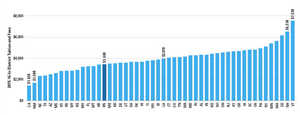In the course of doing research on the cost and price of higher education, I ran across a couple of tables that are very interesting in light of the debate between Democratic nomination candidates Bernie Sanders and Hillary Clinton. Both want college education to be more accessible and affordable, but their assumptions and routes are different. Most pointedly, Sanders says he wants public higher education to be tuition free, and Clinton says she wants it debt free. (There are lots of other differences, but lets just focus on this.)
So, here are two interesting tables published by The College Board.
First, 2015-16 In-District Tuition and Fees at Public 2-Year Institutions by State. My transplant is fuzzy, so find the whole thing here:
What that chart says is that the highest tuition and fees in the country by far for public 2-year colleges are in Vermont, the second highest in NH.
Then, let’s look at 2015-16 In-State Tuition & Fees at Public 4-Year Institutions by State. Again, you can look at the full information is here:
What the chart says is that the highest tuition and fees in the country for public 4-year colleges are in NH, followed very closely by Vermont, with all other state significantly behind them.
I would be fascinated to find out how Senator or Mayor Sanders tried to deal with this situation in his home state, and what effect he had. One might argue that public state tuition and budgets are under the control of the state and not the federal government or the city in which the university resides, so he was powerless to affect this unfortunate situation. But then we have to consider what are the implications for his higher education platform and anticipation of the leverage he would have as President to deal with tuition at public institutions. The federal government certain has had an impact on higher ed finances in many ways over time, but the fact of federalism in a country that rejected the idea of a national university system numerous times over the past 200 years makes the politics and logistics of control of tuition (for example, as compared with debt) very difficult indeed.
http://bit.ly/1KFr64C


